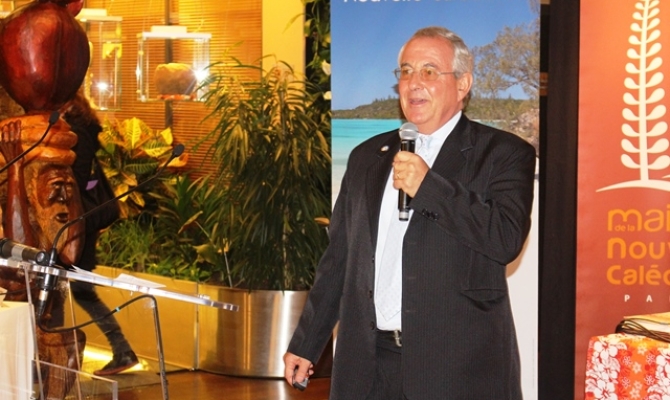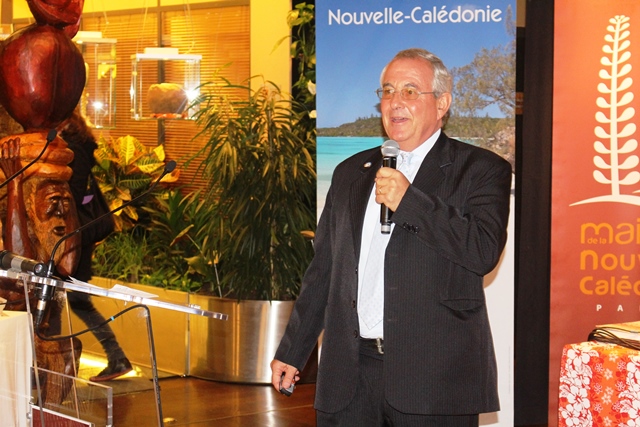
Climate Change Resilience
26 November 2015, Paris, France, COP21 - In Paris this week, on the cusp of the 21st Conference of the Parties to the United Nations Convention on the Framework on Climate Change (UNFCCC COP21), an event hosted by the Government of New Caledonia in Paris focused on Mobilising knowledge for better governance to face the challenges of climate change in the Pacific.
Pacific island challenges are made harder with the impacts of climate change. The island region which consists of 30,000 islands with three of the five lowest countries on earth is one of the most vulnerable regions on earth to the impacts of climate change.

This was made clear by Mr. David Sheppard, the Director-General of the Secretariat of the Pacific Regional Environment Programme (SPREP) who shared the calls from the Pacific islands as the world comes together to negotiate a global agreement to lower global warming and address the impacts of Climate Change.
"The Pacific islands are asking for a Legally Binding Agreement that has the most ambitious targets on the table, calling for global warming to be below 1.5 degrees above preindustrial levels," said Mr. Sheppard.
"Pacific island countries are also calling for Loss and Damage to be included in the agreement, separate from Adaptation."
Ocean Acidification is recognised as a slow onset event under Loss and Damage. This is of concern for the Pacific islands given the regions high dependency on Marine resources. Globally the Oceans are 30% more acidic than before pre-industrial times, which impacts on the formation of corals and shell growing organisms, such as for mollusks.
"While the Pacific islands region contributes to less than 0.03% of the world's total Greenhouse Gases, they are also in the frontline, the first to potentially disappear if Business as usual occurs. Business as Usual is not acceptable to the Pacific."
Mr. Sheppard also highlighted the proactive efforts by the Pacific islands as he quoted the Minister of Foreign Affairs of the Marshall Islands, Tony deBrum – "we are doing more than waving our hands in distress". In the face of the challenges brought by Climate change the Pacific islands region have a number of adaptation and mitigation activities underway.
New Caledonia noted they are strengthening Renewable Energy and conservation efforts; including through establishing some of the world's largest marine protected areas.
"There are many homegrown initiatives that are successful and are underway right now. We must highlight both our concerns and also our success stories," said Mr. Sheppard.

"But the bottom line for the Pacific islands over the next two weeks at COP 21 is that "Failure is not an option". We have been told by our island members over and over again - they are negotiating more than text, they are negotiating for their survival."
The one day event was hosted at the Maison de la Nouvelle-Caledonie in Paris on Wednesday 25 November.
Mr. Sheppard moderated the first Panel consisting of H.E Philippe Germain, President of New Caledonia; Mr Jean-Marc Châtaigner, Director-General of IRD; Minister of Foreign Affairs from Papua New Guinea, Hon Rimbink Pato; Mr. Philippe Gomes, Member of the French Parliament representing New Caledonia; Hon. Steven Ciobo, Australian Minister for International Development and the Pacific; Ambassador Philippe Lacoste France's Special Representative for COP 21 and Mr. Cyril Loisel Policy Officer and Directorate General for Climate Action of the European Commission.
Presenters for the second session included Mr. Michel Eddy, CEO of the French Research Institute; Mr. Gaël Lagadec, President of the University of New Caledonia; Mr. David Sheppard; Mr. Cameron Driver of the Secretariat of the Pacific Community; as well as New Caledonia Youth currently in Paris for the Conference of the Youth. - #4PacIslands
Pacific island challenges are made harder with the impacts of climate change. The island region which consists of 30,000 islands with three of the five lowest countries on earth is one of the most vulnerable regions on earth to the impacts of climate change.

Mr. David Sheppard, Director-General of SPREP
This was made clear by Mr. David Sheppard, the Director-General of the Secretariat of the Pacific Regional Environment Programme (SPREP) who shared the calls from the Pacific islands as the world comes together to negotiate a global agreement to lower global warming and address the impacts of Climate Change.
"The Pacific islands are asking for a Legally Binding Agreement that has the most ambitious targets on the table, calling for global warming to be below 1.5 degrees above preindustrial levels," said Mr. Sheppard.
"Pacific island countries are also calling for Loss and Damage to be included in the agreement, separate from Adaptation."
Ocean Acidification is recognised as a slow onset event under Loss and Damage. This is of concern for the Pacific islands given the regions high dependency on Marine resources. Globally the Oceans are 30% more acidic than before pre-industrial times, which impacts on the formation of corals and shell growing organisms, such as for mollusks.
"While the Pacific islands region contributes to less than 0.03% of the world's total Greenhouse Gases, they are also in the frontline, the first to potentially disappear if Business as usual occurs. Business as Usual is not acceptable to the Pacific."
Mr. Sheppard also highlighted the proactive efforts by the Pacific islands as he quoted the Minister of Foreign Affairs of the Marshall Islands, Tony deBrum – "we are doing more than waving our hands in distress". In the face of the challenges brought by Climate change the Pacific islands region have a number of adaptation and mitigation activities underway.
New Caledonia noted they are strengthening Renewable Energy and conservation efforts; including through establishing some of the world's largest marine protected areas.
"There are many homegrown initiatives that are successful and are underway right now. We must highlight both our concerns and also our success stories," said Mr. Sheppard.

"But the bottom line for the Pacific islands over the next two weeks at COP 21 is that "Failure is not an option". We have been told by our island members over and over again - they are negotiating more than text, they are negotiating for their survival."
The one day event was hosted at the Maison de la Nouvelle-Caledonie in Paris on Wednesday 25 November.
Mr. Sheppard moderated the first Panel consisting of H.E Philippe Germain, President of New Caledonia; Mr Jean-Marc Châtaigner, Director-General of IRD; Minister of Foreign Affairs from Papua New Guinea, Hon Rimbink Pato; Mr. Philippe Gomes, Member of the French Parliament representing New Caledonia; Hon. Steven Ciobo, Australian Minister for International Development and the Pacific; Ambassador Philippe Lacoste France's Special Representative for COP 21 and Mr. Cyril Loisel Policy Officer and Directorate General for Climate Action of the European Commission.
Presenters for the second session included Mr. Michel Eddy, CEO of the French Research Institute; Mr. Gaël Lagadec, President of the University of New Caledonia; Mr. David Sheppard; Mr. Cameron Driver of the Secretariat of the Pacific Community; as well as New Caledonia Youth currently in Paris for the Conference of the Youth. - #4PacIslands